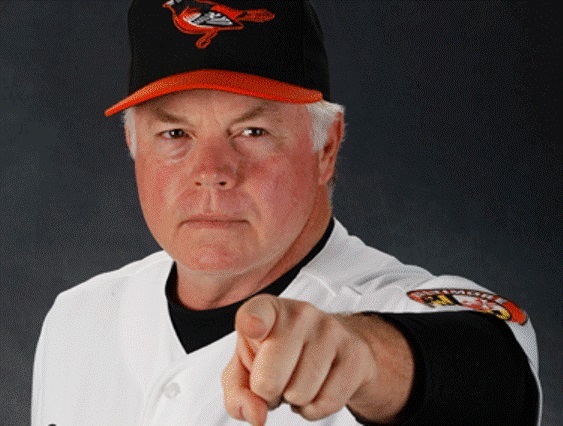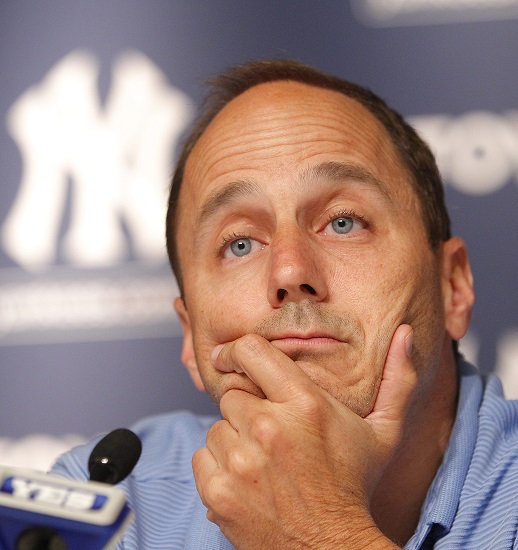Buck Showalter came out to say yesterday that he opposes a life-time ban for Alex Rodriguez from the game. His words were short and to the point and shouldn’t be interpreted as support for the Yankee third baseman. The Baltimore manager believes that the Yankees should be saddled with that brutal contract for it’s remaining four years of duration. Essentially meaning, they made their bed and they should have to sleep in it.

Orioles manager Buck Showalter thinks that teams with suspended players should be forced to pay the salaries of these players instead of getting a free ride for signing them to such ludicrous contracts. (AP Photo)
“If (Commissioner Bud Selig) lets them get away with that, they’re under the luxury tax,” said Showalter. “If they can reset, they can spend again and I guarantee you in two years, Matt Wieters (Baltimore’s catcher) is in New York. They’re the ones that signed (Alex Rodriguez) to that contract.”
Yes, they were. It was 2007 and Rodriguez was 31 years old at the time. They inked him for 10 years at $275 million. It was rather unprecedented at the time to guarantee so much money to a player, extending the contract into his 40s. It was short-sided thinking and a reckless deal. Additionally at the time of the signing, Rodriguez had already been outed in the Mitchell report as a steroid user. The warning signs were all over the place.
People talk about the Dodgers and their record payroll this year, but at least the Dodger contracts with Carl Crawford, Matt Kemp, Hanley Ramirez, Chad Billingsley, Adrian Gonzalez and Andre Ethier all expire when the player reaches age thirty-five or earlier. The contracts that Brian Cashman signed his superstars to in New York usually go well beyond that point.

If A-Rod is suspended for life, Cashman’s Yankees will have a sudden windfall of $90 million to sign someone else.
(Photo credit – Paul J. Bereswill)
Mark Teixeira is signed through age 37. C.C. Sabathia is guaranteed until he’s 37. Derek Jeter to age 41. A-Rod’s deal stretches out to his age 41 season too. Down the I-5 you can throw in the Angels as a team that makes ludicrous long term deals to players such as Albert Pujols and Josh Hamilton. There’s simply a lot of stupidity out there at the back end of those deals.
It’s no wonder that Cashman was flipping out at what seemed to be innocent tweets from Alex Rodriguez to his fans that updated his health and progress in re-hab. The Yankees had to know that the suspension was looming and it was never to their advantage to bring A-Rod back. I’ll dare say that I wouldn’t be surprised if someone in the commissioner’s office tipped them off at what is coming down with the Biogenisis scandal. It’s very likely that their legal team has already assembled and plotted out a way to save the club around $90 million. The suspension (and a lifetime one at that), could possibly save the Yanks a bundle.
It’ll be an interesting series of developments with the announcement of suspensions coming soon. There certainly will be implications for teams that won’t have to pay big money to some of their stars. A lot of reshuffling of resources is bound to happen.
A perfect solution that would pay huge benefits would be to drop the money that was to be paid to suspended players in payroll to retired players funds, scouts and the Baseball Assistance Team (BAT). The NBA has player fines and suspensions all paid to charity, and baseball could make a similar gesture in this attempt to clean up the game of PEDs.
Helping out the underfunded baseball people that have done so much for the game without adequate compensation would be an excellent shift of resources and a great public relations move. On top of that, it’s the right thing to do. Instead of money going towards A-Rod’s houses and luxury cars, the medical bills of retired players could be paid and their pensions could become more respectable. An influx of around $100 million would do so much good to that cause.
It’s such a great idea that it’ll never happen.




 August 2nd, 2013 at 6:00 am
August 2nd, 2013 at 6:00 am  by Evan Bladh
by Evan Bladh  Posted in
Posted in 

I actually just recently learned that the Dodgers did not have to pay Manny’s salary when he was suspended for his PED use (the first time). All along I had thought that his money went into a general fund (much like what you suggest in your article, Evan). When I learned that the Dodgers had gotten a free ride, I was quite surprised.
This all boils down to what I have been saying for years – the risk must outweigh the reward for these cheaters and until it does, the cheating will continue. I have also said that contracts should immediately become void, but this falls right into what Buck Showalter said and is something that I never even considered. By putting some of the heat on the owners, they will definitely begin to think twice about signing guys to these insane long term contracts.
Interestingly enough, Kevin Kennedy has been very vocal about the Biogenesis scandal saying that team owners are partly responsible for the cheating by agreeing to these huge contracts, which almost encourages players to cheat in order to get them (another way of saying that risk vs. reward thing), but here again, I never even considered holding team owners accountable.
The flip side to this of course is that if teams flat out refuse to negotiate and sign guys to these contracts, it basically amounts to collusion, which is outlawed in the MLB.
Although I understand how and why free agency and collective bargaining came about, it changed the game forever. It created a huge wall between the MLB and the MLBPA – one that is more adversarial that agreeable. As such, the MLBPA will always rebuke almost everything that the MLB wants or suggests, including harsher penalties for PED use. And though many individual players have come out and stated that they are in favor of harsher penalties, as a whole the players’ union continues to fight it – primarily because of the financial impact on the very cheaters that they supposedly want to get rid of.
Again I say that until the risks outweigh the rewards, there will always be PED users in baseball – with or without the blessings of the MLBPA.
RT @Think_BlueLA: New post – Holding Teams Accountable for Reckless Long Term Contracts